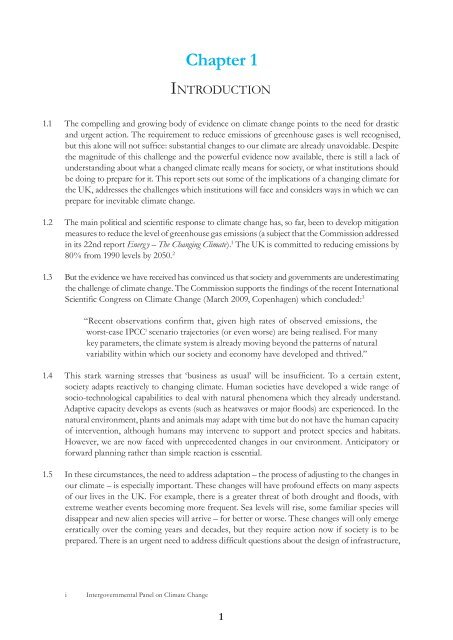Twenty-eighth Report Adapting Institutions to Climate Change Cm ...
Twenty-eighth Report Adapting Institutions to Climate Change Cm ...
Twenty-eighth Report Adapting Institutions to Climate Change Cm ...
You also want an ePaper? Increase the reach of your titles
YUMPU automatically turns print PDFs into web optimized ePapers that Google loves.
1.1<br />
1.2<br />
1.3<br />
1.4<br />
1.5<br />
Chapter 1<br />
INTRODUCTION<br />
The compelling and growing body of evidence on climate change points <strong>to</strong> the need for drastic<br />
and urgent action. The requirement <strong>to</strong> reduce emissions of greenhouse gases is well recognised,<br />
but this alone will not suffice: substantial changes <strong>to</strong> our climate are already unavoidable. Despite<br />
the magnitude of this challenge and the powerful evidence now available, there is still a lack of<br />
understanding about what a changed climate really means for society, or what institutions should<br />
be doing <strong>to</strong> prepare for it. This report sets out some of the implications of a changing climate for<br />
the UK, addresses the challenges which institutions will face and considers ways in which we can<br />
prepare for inevitable climate change.<br />
The main political and scientific response <strong>to</strong> climate change has, so far, been <strong>to</strong> develop mitigation<br />
measures <strong>to</strong> reduce the level of greenhouse gas emissions (a subject that the Commission addressed<br />
in its 22nd report Energ y – The Changing <strong>Climate</strong>). 1 The UK is committed <strong>to</strong> reducing emissions by<br />
80% from 1990 levels by 2050. 2<br />
But the evidence we have received has convinced us that society and governments are underestimating<br />
the challenge of climate change. The Commission supports the findings of the recent International<br />
Scientific Congress on <strong>Climate</strong> <strong>Change</strong> (March 2009, Copenhagen) which concluded: 3<br />
“Recent observations confirm that, given high rates of observed emissions, the<br />
worst-case IPCC i scenario trajec<strong>to</strong>ries (or even worse) are being realised. For many<br />
key parameters, the climate system is already moving beyond the patterns of natural<br />
variability within which our society and economy have developed and thrived.”<br />
This stark warning stresses that ‘business as usual’ will be insufficient. To a certain extent,<br />
society adapts reactively <strong>to</strong> changing climate. Human societies have developed a wide range of<br />
socio-technological capabilities <strong>to</strong> deal with natural phenomena which they already understand.<br />
Adaptive capacity develops as events (such as heatwaves or major floods) are experienced. In the<br />
natural environment, plants and animals may adapt with time but do not have the human capacity<br />
of intervention, although humans may intervene <strong>to</strong> support and protect species and habitats.<br />
However, we are now faced with unprecedented changes in our environment. Anticipa<strong>to</strong>ry or<br />
forward planning rather than simple reaction is essential.<br />
In these circumstances, the need <strong>to</strong> address adaptation – the process of adjusting <strong>to</strong> the changes in<br />
our climate – is especially important. These changes will have profound effects on many aspects<br />
of our lives in the UK. For example, there is a greater threat of both drought and floods, with<br />
extreme weather events becoming more frequent. Sea levels will rise, some familiar species will<br />
disappear and new alien species will arrive – for better or worse. These changes will only emerge<br />
erratically over the coming years and decades, but they require action now if society is <strong>to</strong> be<br />
prepared. There is an urgent need <strong>to</strong> address difficult questions about the design of infrastructure,<br />
i Intergovernmental Panel on <strong>Climate</strong> <strong>Change</strong><br />
1
















